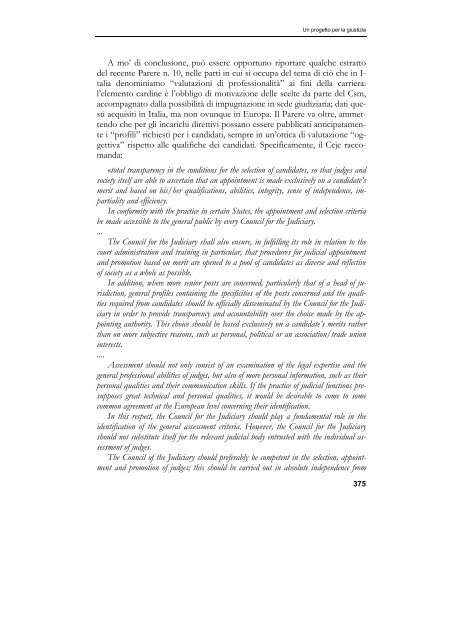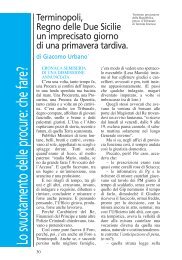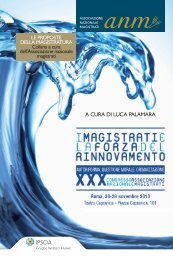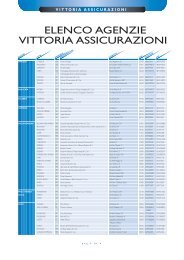- Page 1 and 2:
LE PROPOSTE DELLA MAGISTRATURA Coll
- Page 3 and 4:
Piero MARRAZZO, Presidente della Re
- Page 5 and 6:
VIII Introduzione Claudio Viazzi ..
- Page 8 and 9:
Introduzione Introduzione Il sistem
- Page 10:
Introduzione zie fondamentali dello
- Page 14 and 15:
Gianni Alemanno Sindaco di Roma Ind
- Page 16 and 17:
Indirizzi di saluto Ma assumono alt
- Page 18 and 19:
Indirizzi di saluto scriminata, di
- Page 20 and 21:
Indirizzi di saluto mosaico che dev
- Page 22 and 23:
Paolo Auriemma presidente della sez
- Page 24 and 25:
Edeo De Vincentiis sezione Anm magi
- Page 26 and 27:
Indirizzi di saluto Abbiamo, infine
- Page 28 and 29:
Indirizzi di saluto Peraltro, le pr
- Page 30:
Indirizzi di saluto MESSAGGI Caro P
- Page 33 and 34:
Luca Palamara rimedi a tale situazi
- Page 35 and 36:
Luca Palamara Sin dalle sue origini
- Page 37 and 38:
Luca Palamara cessi e con le senten
- Page 39 and 40:
Luca Palamara E l’Associazione co
- Page 41 and 42:
Luca Palamara 3. La durata eccessiv
- Page 43 and 44:
Luca Palamara ingresso illegale nel
- Page 45 and 46:
Luca Palamara - rivitalizzare il pr
- Page 47 and 48:
Luca Palamara ad interpretare (il p
- Page 49 and 50:
Luca Palamara Repubblica durante la
- Page 51 and 52:
Luca Palamara 8. I giovani magistra
- Page 53 and 54:
Luca Palamara mafia. A Rosario Liva
- Page 55 and 56:
Marcello Matera vità della magistr
- Page 57 and 58:
Marcello Matera implicazioni sul bi
- Page 59 and 60:
Rita Sanlorenzo Rita Sanlorenzo seg
- Page 61 and 62:
Rita Sanlorenzo Aspettiamo le rifor
- Page 63 and 64:
Rita Sanlorenzo ta consequenzialit
- Page 65 and 66:
Rita Sanlorenzo Se questa è la sco
- Page 67 and 68:
Carlo Coco la politica, nel diverso
- Page 69 and 70:
Carlo Coco sorse invariate, semplic
- Page 71 and 72:
Carlo Coco con l’azione della Giu
- Page 73 and 74:
Carlo Coco Altrettanto mi sembra ve
- Page 75 and 76:
Carlo Coco dernizzazione delle proc
- Page 77 and 78:
Carlo Citterio Carlo Citterio segre
- Page 79 and 80:
Carlo Citterio È una proposta che
- Page 81 and 82:
Carlo Citterio in tale direzione di
- Page 83 and 84:
Carlo Citterio terventi normativi,
- Page 85 and 86:
Carlo Citterio magistrato. L’azio
- Page 87 and 88:
Carlo Citterio futuro: abbiamo cart
- Page 90 and 91:
Luca Minniti giudice, Tribunale di
- Page 92 and 93:
Un progetto per la giustizia ad un
- Page 94 and 95:
Un progetto per la giustizia L’or
- Page 96 and 97:
2.1. Il settore penale Un progetto
- Page 98 and 99:
2.3. I magistrati dirigenti Un prog
- Page 100 and 101:
Un progetto per la giustizia Inoltr
- Page 102 and 103:
Un progetto per la giustizia Il Min
- Page 104 and 105:
4. La funzione organizzativa dell
- Page 106 and 107:
Un progetto per la giustizia - l’
- Page 108 and 109:
Un progetto per la giustizia nistra
- Page 110 and 111:
Un progetto per la giustizia 2) la
- Page 112 and 113:
Mariano Sciacca giudice, Tribunale
- Page 114 and 115:
Un progetto per la giustizia i tett
- Page 116 and 117:
*** Al Consiglio superiore della ma
- Page 118 and 119:
Un progetto per la giustizia udienz
- Page 120 and 121:
Un progetto per la giustizia Ogni g
- Page 122 and 123:
Un progetto per la giustizia - quan
- Page 124 and 125:
Magistrati del distretto di Corte d
- Page 126 and 127:
Piergiorgio Morosini giudice, Tribu
- Page 128 and 129:
Un progetto per la giustizia c) abo
- Page 130 and 131:
Un progetto per la giustizia più s
- Page 132 and 133:
Tabella 2 - Giustizia amministrativ
- Page 134 and 135:
Un progetto per la giustizia le «p
- Page 136 and 137:
Un progetto per la giustizia ciali
- Page 138 and 139:
Un progetto per la giustizia assicu
- Page 140 and 141:
Un progetto per la giustizia come b
- Page 142 and 143:
Un progetto per la giustizia ganizz
- Page 144 and 145:
Un progetto per la giustizia Congre
- Page 146 and 147:
Un progetto per la giustizia poli
- Page 148 and 149:
Raffaele Ceniccola sostituto Procur
- Page 150 and 151:
Un progetto per la giustizia - modu
- Page 152 and 153:
Un progetto per la giustizia della
- Page 154 and 155:
Un progetto per la giustizia sarann
- Page 156 and 157:
Un progetto per la giustizia copyri
- Page 158 and 159:
Un progetto per la giustizia ro che
- Page 160 and 161:
Un progetto per la giustizia misure
- Page 162 and 163:
Un progetto per la giustizia costit
- Page 164 and 165:
Un progetto per la giustizia Chi sa
- Page 166 and 167:
Rossana Zappasodi giudice, Tribunal
- Page 168 and 169:
Un progetto per la giustizia to, pe
- Page 170 and 171:
Un progetto per la giustizia influi
- Page 172 and 173:
Lanfranco Tenaglia onorevole Un pro
- Page 174 and 175:
Un progetto per la giustizia revisi
- Page 176 and 177:
Francesco Menditto giudice, Tribuna
- Page 178 and 179:
Un progetto per la giustizia Vorrei
- Page 180 and 181:
Un progetto per la giustizia zione
- Page 182 and 183:
Un progetto per la giustizia In que
- Page 184 and 185:
Un progetto per la giustizia quasi
- Page 186 and 187:
Pietro Porri segretario nazionale d
- Page 188 and 189:
Franco Siddi presidente della Feder
- Page 190 and 191:
Federico Augusto Mazza Un progetto
- Page 192 and 193:
Un progetto per la giustizia gnano
- Page 194 and 195:
Un progetto per la giustizia Questo
- Page 196:
Un progetto per la giustizia per po
- Page 201 and 202:
Marcello Maddalena Procuratore dell
- Page 203 and 204:
Un progetto per la giustizia - l’
- Page 205 and 206:
Un progetto per la giustizia Eppure
- Page 207 and 208:
Un progetto per la giustizia dinari
- Page 209 and 210:
Un progetto per la giustizia dell
- Page 211 and 212:
Un progetto per la giustizia prelim
- Page 213 and 214:
Un progetto per la giustizia mazion
- Page 215 and 216:
Pasquale D’Ascola consigliere, Co
- Page 217 and 218:
Un progetto per la giustizia razion
- Page 219 and 220:
Un progetto per la giustizia guendo
- Page 221 and 222:
Un progetto per la giustizia zione
- Page 223 and 224:
Un progetto per la giustizia ritard
- Page 225 and 226:
Un progetto per la giustizia F. Cip
- Page 227 and 228:
Un progetto per la giustizia esclus
- Page 229 and 230:
Un progetto per la giustizia vanzat
- Page 231 and 232:
Un progetto per la giustizia Quel d
- Page 233 and 234:
Un progetto per la giustizia ciente
- Page 235 and 236:
Nello Rossi procuratore aggiunto, P
- Page 237 and 238:
Un progetto per la giustizia - ed
- Page 239 and 240:
5. In conclusione Un progetto per l
- Page 241 and 242:
Un progetto per la giustizia to un
- Page 243 and 244:
Un progetto per la giustizia Tutta
- Page 245 and 246:
Un progetto per la giustizia propri
- Page 247 and 248:
Un progetto per la giustizia In que
- Page 249 and 250:
Un progetto per la giustizia questo
- Page 251 and 252:
Un progetto per la giustizia lavoro
- Page 253 and 254:
Un progetto per la giustizia Un’a
- Page 255 and 256:
Un progetto per la giustizia ni, al
- Page 257 and 258:
Un progetto per la giustizia Da tem
- Page 259 and 260:
Edmondo Bruti Liberati procuratore
- Page 261 and 262:
3. La riforma dell’ordinamento gi
- Page 263 and 264:
Mario Cicala consigliere, Corte di
- Page 265 and 266:
Vito D’Ambrosio sostituto Procura
- Page 267 and 268:
Un progetto per la giustizia zional
- Page 269 and 270:
Carlo Fucci Un progetto per la gius
- Page 271 and 272:
Ezia Maccora componente del Csm Un
- Page 273 and 274:
Un progetto per la giustizia Uno sf
- Page 275 and 276:
Un progetto per la giustizia profes
- Page 277 and 278:
Un progetto per la giustizia di par
- Page 279 and 280:
Un progetto per la giustizia prassi
- Page 281 and 282:
Un progetto per la giustizia progre
- Page 283 and 284:
Antonello Ardituro sostituto, Procu
- Page 285 and 286:
Un progetto per la giustizia ha del
- Page 287 and 288:
Un progetto per la giustizia ficien
- Page 289 and 290:
Alfredo Viola componente del Csm Un
- Page 291 and 292:
Cosimo Maria Ferri componente del C
- Page 293 and 294:
Un progetto per la giustizia cidere
- Page 295 and 296:
Un progetto per la giustizia rinunc
- Page 297 and 298:
Carlo Sabatini giudice, Tribunale d
- Page 299 and 300:
Un progetto per la giustizia Va poi
- Page 301 and 302:
Un progetto per la giustizia indubb
- Page 303 and 304:
Un progetto per la giustizia simpat
- Page 305 and 306:
Un progetto per la giustizia 3) imm
- Page 307 and 308:
Un progetto per la giustizia profes
- Page 309 and 310:
Roberto Conti giudice, Tribunale di
- Page 311 and 312:
Un progetto per la giustizia munici
- Page 313 and 314:
Un progetto per la giustizia lori f
- Page 315 and 316:
Giusto Sciacchitano sostituto, Dire
- Page 317 and 318:
Un progetto per la giustizia all’
- Page 319 and 320:
Luca Poniz Un progetto per la giust
- Page 321 and 322:
Un progetto per la giustizia come d
- Page 323 and 324:
Un progetto per la giustizia coltiv
- Page 325 and 326:
Lucio Aschettino giudice, Tribunale
- Page 327 and 328:
Un progetto per la giustizia Ma sul
- Page 329 and 330:
Tommaso Virga presidente di Sezione
- Page 331 and 332:
Un progetto per la giustizia produt
- Page 333 and 334:
Un progetto per la giustizia E tali
- Page 335 and 336: Un progetto per la giustizia Si tra
- Page 337 and 338: Un progetto per la giustizia dotte
- Page 339 and 340: Un progetto per la giustizia - impl
- Page 341 and 342: Un progetto per la giustizia 11) un
- Page 343 and 344: Un progetto per la giustizia 1) sia
- Page 345 and 346: Un progetto per la giustizia Paradi
- Page 347 and 348: Un progetto per la giustizia propos
- Page 349 and 350: Fernanda Cervetti Commissione Pari
- Page 351 and 352: Un progetto per la giustizia L’ul
- Page 353 and 354: Ancona 2 su 6 Bari 2 su 6 Bologna 4
- Page 355 and 356: Un progetto per la giustizia dinari
- Page 357 and 358: Un progetto per la giustizia uomini
- Page 359 and 360: Un progetto per la giustizia mo con
- Page 361 and 362: Un progetto per la giustizia questo
- Page 363 and 364: Un progetto per la giustizia to del
- Page 365 and 366: Un progetto per la giustizia non so
- Page 367 and 368: Un progetto per la giustizia tirne
- Page 369 and 370: Evelina Canale Admi - Associazione
- Page 371 and 372: Un progetto per la giustizia Ancora
- Page 373 and 374: Un progetto per la giustizia ziari,
- Page 375: SABATO 7 GIUGNO 2008 UN PROGETTO PE
- Page 378 and 379: Gianluigi Morlini - il riordino del
- Page 380 and 381: Gianluigi Morlini giurisprudenziali
- Page 382 and 383: Gianluigi Morlini lutazione della C
- Page 384 and 385: Raffaele Sabato magistrature 4 , da
- Page 388 and 389: Raffaele Sabato the legislature or
- Page 390 and 391: Aldo Morgigni Io ritengo, invece, c
- Page 392 and 393: Franco Cassano dell’immagine idea
- Page 394 and 395: Franco Cassano un malessere, indivi
- Page 396 and 397: Claudio Gittardi Claudio Gittardi s
- Page 398 and 399: Claudio Gittardi zione degli indica
- Page 400 and 401: Claudio Gittardi In questa prospett
- Page 402 and 403: Claudio Gittardi Ove non occorra al
- Page 404 and 405: Claudio Gittardi Come vedete in ent
- Page 406 and 407: Paolo Corder societario). Abbiamo a
- Page 408 and 409: Paolo Corder Se nulla sarà fatto,
- Page 410 and 411: Elisabetta Cesqui Cresce nella magi
- Page 412 and 413: Elisabetta Cesqui sia reiterato, gr
- Page 414 and 415: Elisabetta Cesqui ma non attribuiam
- Page 416 and 417: Paola Di Nicola Il clima politico e
- Page 418 and 419: Paola Di Nicola sono prima di tutto
- Page 420 and 421: Carla Rufini giustizia, Mastella e
- Page 422 and 423: Luca De Matteis Corte di Strasburgo
- Page 424 and 425: Luca De Matteis 3.2. Inesistenza di
- Page 426 and 427: Luca De Matteis Tuttavia, anche se
- Page 428 and 429: Luca De Matteis Ma bisogna andare a
- Page 430 and 431: Luca De Matteis 6. Conclusioni Qual
- Page 432 and 433: Luca De Matteis radicale della nost
- Page 434 and 435: Alessandro Cajola Io parto dal pres
- Page 436 and 437:
424
- Page 438 and 439:
Andrea Reale sindacale dell’Assoc
- Page 440 and 441:
Andrea Reale natore della Repubblic
- Page 442 and 443:
Giuseppe Corasaniti Così la dispon
- Page 445 and 446:
Giuseppe Cascini segretario general
- Page 447 and 448:
Un progetto per la giustizia nel se
- Page 449 and 450:
Un progetto per la giustizia A chi
- Page 451:
Un progetto per la giustizia perior
- Page 454 and 455:
Documento conclusivo la celebrazion
- Page 456 and 457:
Documento conclusivo all’operato






